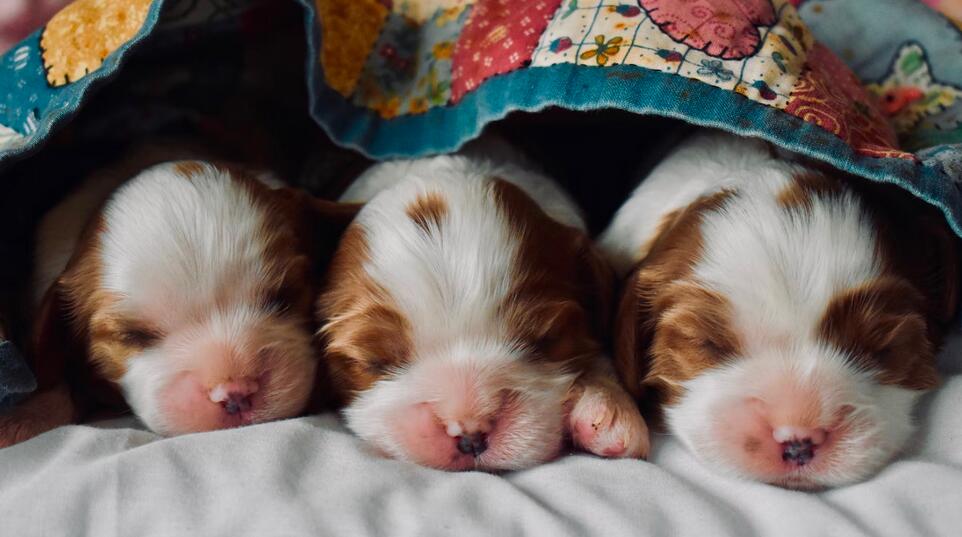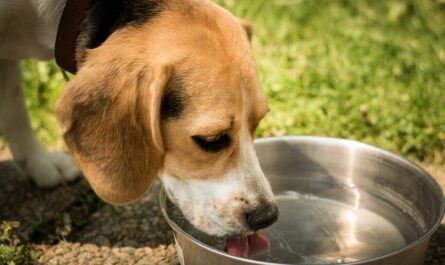As a new pet owner, there’s a lot to learn about your furry friend. From understanding their dietary needs to deciphering their behavior, it’s a journey filled with discovery, joy, and sometimes, a bit of concern. One such moment might come when you notice your puppy breathing fast while sleeping. Does this mean there’s something wrong? Or is it just a part of their normal behavior? Let’s delve into this topic and put your worries to rest.
What Breathing Rate in Puppies Is Considered Normal
Before we jump into the specifics, let’s try to understand the basic physiology of a puppy. Puppies, like all mammals, need to breathe to live. Breathing provides the oxygen that their bodies need to function, and it also helps to remove carbon dioxide.
On average, you can expect a resting puppy to breathe between 15 and 40 times per minute. The rate can vary based on several factors such as the puppy’s age, breed, size, and overall health status. For instance, smaller breeds and puppies tend to have faster breathing rates compared to larger dogs and mature ones. An adult dog, in contrast, usually has a slower breathing rate, generally around 10 to 30 times per minute.
Can You Determine Your Pup’s Breathing Rate During Sleep
Observing your puppy’s breathing rate while they sleep may be a bit more challenging. During sleep, a puppy’s breathing rate can significantly increase, sometimes even double. This frequent fluctuation is perfectly normal and primarily due to their sleep cycle.
Just like humans, puppies go through several sleep stages, including periods of Rapid Eye Movement (REM) sleep. During REM sleep, the brain activity increases, often leading to dreaming. This heightened brain activity can cause changes in the puppy’s breathing rate, making it faster than during their awake or non-REM sleep stages.
Your Pup Is Breathing Fast While Sleeping – When Not to Worry
Even though it might seem alarming at first, there are several reasons why a puppy might breathe fast during sleep that do not involve any health issues.
Active Dreams and REM Sleep
Just like humans, puppies experience different stages of sleep, including the Rapid Eye Movement (REM) stage. During REM sleep, puppies may exhibit increased breathing rates, twitching, and even vocalizations. This is completely normal and indicative of active dreaming. It’s a sign that your puppy’s brain is processing information and creating memories.
Temperature Regulation
Puppies have less developed temperature regulation systems compared to adult dogs. As a result, they may breathe faster while sleeping to maintain a stable body temperature. This accelerated breathing aids in dissipating excess heat and keeping their bodies cool. Ensuring a comfortable sleeping environment with proper ventilation can help alleviate this.
Growth and Metabolism
Puppies undergo rapid growth and have higher metabolic rates than adult dogs. Their bodies are constantly working to support this growth, which can lead to increased respiratory rates, even during sleep. As your puppy grows older, their breathing may gradually normalize.
Physical Exertion and Play
Puppies are bundles of energy, and their playfulness knows no bounds. They often engage in intense physical activity, chasing toys and exploring their surroundings. After such bouts of play, it’s common for puppies to experience a temporary increase in respiratory rate while sleeping. It’s their body’s way of recovering and replenishing oxygen levels.
Stress and Anxiety
Just like humans, puppies can experience stress and anxiety. New environments, separation from their littermates, or unfamiliar noises can trigger a stress response. This may manifest as rapid breathing while sleeping. Creating a calm and secure environment for your puppy, providing them with a cozy sleeping space, and gradually introducing them to new experiences can help reduce stress levels.
Your Pup Is Breathing Fast During Sleep – When Should You Consult a Veterinarian
While fast breathing can be a normal part of a puppy’s sleep cycle, there are times when it could be a sign of a health concern. If your puppy seems to be gasping for air, wheezing, or coughing, or if they seem uncomfortable or distressed when they wake up, these could be symptoms of a health issue.
Similarly, if your puppy’s fast breathing is accompanied by other worrying signs such as loss of appetite, lethargy, or a significant change in behavior, it’s best to consult a vet as soon as possible.
It’s important to remember that you know your pet best. Trust your instincts. If something doesn’t seem right, it’s better to be safe and seek a professional opinion.
Could It Be a Breathing Disorder?
While fast breathing during sleep is usually nothing to worry about, it’s good to be aware of the signs of breathing disorders that require veterinary attention. Conditions such as Brachycephalic Syndrome, common in flat-faced breeds like Bulldogs and Pugs, or other respiratory disorders, can lead to difficulties in breathing.
Signs of a breathing disorder can include excessive panting, noisy breathing, blue gums, or difficulty catching their breath. If you notice any of these symptoms, it’s crucial to consult with a vet.

Health Conditions That May Cause Your Pup to Breathe Rapidly During Sleep
Several health conditions can cause your puppy to breathe rapidly during sleep. It’s essential to be aware of these conditions and their other symptoms to ensure early detection and treatment.
Chronic Bronchitis
Chronic bronchitis in dogs is an inflammation of the bronchial tubes, the airways that carry air to the lungs. This condition can cause your puppy to breathe rapidly and cough persistently. Other symptoms may include exercise intolerance and wheezing. If your puppy is showing these signs, it’s important to consult your vet for a proper diagnosis and treatment plan.
Trachea Problems
Certain breeds, particularly small ones, are prone to a condition known as tracheal collapse. This condition occurs when the trachea, which carries air from the throat to the lungs, partially collapses or narrows, making breathing difficult.
Symptomsof tracheal collapse include rapid breathing, a distinctive honking cough, intolerance to exercise, and in severe cases, a blue tint to their gums or tongue due to a lack of oxygen. If you notice these symptoms in your puppy, it’s crucial to seek veterinary care immediately.
Dyspnea
Dyspnea, or difficulty breathing, can be caused by a wide range of medical issues, from heart disease to pneumonia to obstructions in the airway. This condition is often noticeable as the puppy will appear to struggle to breathe and may even make noticeable noises.
If your puppy shows signs of distress, such as wide-open mouth breathing, excessively flared nostrils, or if their belly and chest move significantly while breathing, it’s essential to seek immediate medical attention.
Heart Problems
Heart diseases can also lead to rapid breathing in puppies. These conditions can range from congenital heart defects, which are present at birth, to acquired heart diseases, which develop over time. Other signs of heart problems can include fatigue, loss of appetite, and a persistent cough, especially during or after exercise or at night.
If you suspect that your puppy might have heart problems, it’s best to consult your vet. They can conduct a thorough examination and appropriate tests to diagnose the condition and suggest a suitable treatment plan.
Other Reasons for Rapidly Breathing
Apart from sleep and the health conditions mentioned earlier, there are other reasons why your puppy might be breathing rapidly.
Food Poisoning
Puppies are notorious for their curiosity and their tendency to eat things they shouldn’t. If your puppy ingests something harmful, it could lead to food poisoning. Symptoms of food poisoning can include rapid breathing, vomiting, diarrhea, and lethargy.
If you suspect your puppy has consumed something toxic, contact your veterinarian immediately. It’s beneficial to keep a list of common household items and foods that can be dangerous to puppies, such as chocolate, xylitol (a sweetener used in many products), certain plants, and some human medications.
Side Effects of Medication
Certain medications, like some types of heartworm preventatives or pain medications, can cause rapid breathing as a side effect. If your puppy has recently started a new medication and you notice their breathing has become fast, consult your vet. They might adjust the dosage or switch to a different medication if needed.
How to Ensure Healthy Puppy Breathing?
To help maintain your puppy’s healthy breathing, there are a few things you can do.
Monitor and Observe
While rapid breathing during sleep is often harmless, it’s essential to monitor your puppy’s overall health and behavior. Keep an eye out for any signs of distress, labored breathing, coughing, wheezing, or excessive panting. If your puppy appears unwell or exhibits concerning symptoms, it’s important to consult your veterinarian promptly.
Create a Comfortable Sleeping Environment
Ensuring your puppy has a comfortable and peaceful sleeping environment is crucial for their well-being. Consider the following tips:
- Choose a cozy bed or crate that provides a sense of security and comfort.
- Place the bed or crate in a quiet area away from excessive noise or activity.
- Maintain an appropriate room temperature to promote restful sleep. Avoid extreme heat or cold that could disrupt your puppy’s comfort.
- Provide proper ventilation to ensure a fresh airflow, reducing the likelihood of overheating.
- Consider using white noise or gentle backgroundmusic to create a soothing ambiance that can help your puppy relax and sleep more soundly.
Regular Vet Check-ups
Routine visits to your veterinarian are crucial for monitoring your puppy’s health and development. Your vet can address any concerns you may have regarding your puppy’s breathing patterns during sleep and provide professional guidance.
They will conduct thorough examinations, perform necessary tests, and offer tailored advice based on your puppy’s specific needs. Regular check-ups also ensure that any potential health issues are detected early.
Training and Socialization
Proper training and socialization play a vital role in minimizing stress and anxiety in puppies. Positive reinforcement-based training methods can help build their confidence and teach them how to cope with various situations.
Socializing your puppy with other friendly dogs and exposing them to different environments gradually can help them develop resilience and adaptability. This, in turn, can contribute to a calm and relaxed state, promoting better sleep quality.
Seek Professional Help
If your puppy’s rapid breathing persists or is accompanied by other concerning symptoms, it’s crucial to consult a professional. A veterinarian or a certified animal behaviorist can assess your puppy’s specific situation and provide specialized guidance.
They may recommend additional interventions, such as behavioral modification techniques or anxiety management strategies.This can help address any underlying issues.
Wrapping Up
Understanding your puppy’s breathing rate can help you ensure their wellbeing and spot potential health issues early. However, remember that puppies, like human babies, have different patterns and behaviors. While it’s essential to be vigilant, it’s also important not to worry too much about every little thing.
Always remember, if something doesn’t feel right, trust your instincts and consult your vet. And in the midst of all this, don’t forget to enjoy the wonderful journey of pet parenthood.





